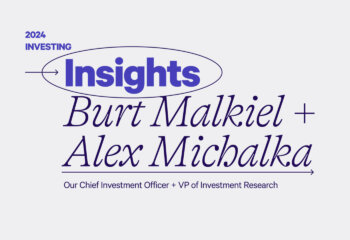Selling off stocks when the market dips and returning only when things calm down is emotional, not rational.
It’s not yet Halloween, but many have already been spooked by the 3% drop in the market on Wednesday. Before giving in to panic and pulling your money out of the market, take a breath and heed this piece of advice from financial professionals: Stay calm and stay the course.
What does a stock market dip mean?
You may have seen these numbers being thrown around since Wednesday’s downturn: The Dow Jones Industrial Average tumbled by 832 points; Fidelity saw a 20% jump in its trading volume; Amazon’s CEO Jeff Bezos lost almost $10 billion within 24 hours. Those headlines would make anyone uneasy.
This week’s downturn was likely caused by the rising long-term rates, which increases borrowing costs and reduces corporate profits, especially since the Federal Reserve seems to be planning on raising short-term rates for the foreseeable future. In addition, as trade tension between US and China escalates, there have been continued worries about a slowdown in China’s economy, which drags down the broader market.
Just how bad was it?
Not that bad. As long as earnings and the US economy continues to grow, the dip could be a healthy market self-adjustment move. Plus, markets generally go up in the long term, and a recent volatility is unlikely to affect your long-term investment returns.
In fact, this week’s fluctuation is a “non-event” by historical standards. By the end of this week, markets are already showing signs of stabilization.
Many may not like precipitous drops, but in order to earn the attractive long-run rates of return on equities, investors must be prepared to bear the associated risks. In fact, risks are also the reason why stocks go up on average over the long run, and they ultimately reward you with investment returns. It’s all about balancing your risk and reward so that in the long term your overall wealth is steadily growing.
As Jakub Jurek, our VP of Research, explains:
“During the last 20 years alone, there have been 25 months (i.e. more than every tenth month) where the S&P 500 index dropped by more than 5% in a month, with the decline averaging -7.9% among those 25 months. Despite this, over this time period the annualized compound growth rate on the index has been +6.3% per year. “
What should you do?
Nothing. Selling off stocks and returning only when things calm down is emotional, not rational. Data has proven that we are always able to overcome dips and recessions successfully.
Imagine this: You had invested in an S&P 500 Index account during the market decline in late 2007. On January 1, 2008, you decided to pull out $100,000 from the market and put it into a savings account with a 2% interest. As of June 30, 2018, that account balance would be $123,000.
But what if you hadn’t moved your investment? Ten years later, you would have seen a 130% return, meaning your money would be worth $230,000 today — a difference of $107,000.*
“If you take money out of your accounts in anticipation over a market downturn, it’s hard to know when you should put your money back in,” says Celine Sun, Wealthfront’s Director of Research. “This means that most likely, you’ll miss the upside returns more than you’ll avoid the downside.”
Another good strategy to balance your risk and reward is to invest in companies in both developed and developing economies outside of the US. That way you can overcome the “home bias” and take advantage of foreign and emerging markets.
What’s the best way to weather these storms in the future?
Two words: passive investing.
Passive investing builds on the assumption that markets will grow over the long term, which is a safe assumption since global economies have consistently increased in value over the last several decades. And this trend is expected to continue.
By passively investing, you’re following the movement of the entire market rather than just a few stocks. As long as the entire market grows over time, your wealth will accumulate.
Passive investing might not make you a millionaire overnight, but it does help you take slow, steady, and calculated risks vs. the roll of the dice that is stock picking. Investors who passively invest are not looking to outperform the market; rather, they are looking to build their wealth over time. So if this is what you’re after, our advice is to ignore the news headlines and stay focused on the future. We know it can be emotional, but rest assured: Your money will be safe over the long term.
*Source: Wealthfront Research, 01/01/2008 – 06/30/2018.
S&P 500 return is based on SPY data (from CRSP)
Disclosure
This blog is powered by Wealthfront Advisers LLC (“Wealthfront Advisers,” and the successor investment adviser to Wealthfront Inc.). The information contained in this blog is provided for general informational purposes, and should not be construed as investment advice. Any links provided to other server sites are offered as a matter of convenience and are not intended to imply that Wealthfront Advisers or its affiliates endorses, sponsors, promotes and/or is affiliated with the owners of or participants in those sites, or endorses any information contained on those sites, unless expressly stated otherwise.
Wealthfront Advisers may from time to time publish content in this blog and/or on this site that has been created by affiliated or unaffiliated contributors. These contributors may include Wealthfront Advisers employees, other financial advisors, third-party authors who are paid a fee by Wealthfront Advisers, or other parties. Unless otherwise noted, the content of such posts does not necessarily represent the actual views or opinions of Wealthfront or any of its officers, directors, or employees. The opinions expressed by guest bloggers and/or blog interviewees are strictly their own and do not necessarily represent those of Wealthfront Advisers or any of its affiliates. Wealthfront Advisers is a SEC registered investment adviser, and a wholly owned subsidiary of Wealthfront Corporation.
© 2018 Wealthfront Corporation. All rights reserved. Please read important legal disclosures about this blog.
About the author(s)
The Wealthfront Team believes everyone deserves access to sophisticated financial advice. The team includes Certified Financial Planners (CFPs), Chartered Financial Analysts (CFAs), a Certified Public Accountant (CPA), and individuals with Series 7 and Series 66 registrations from FINRA. Collectively, the Wealthfront Team has decades of experience helping people build secure and rewarding financial lives. View all posts by The Wealthfront Team



